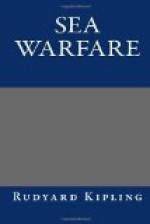Meantime, there is a large and unlovely water, inhabited by plain men in severe boats, who endure cold, exposure, wet, and monotony almost as heavy as their responsibilities. Charge them with heroism—but that needs heroism, indeed! Accuse them of patriotism, they become ribald. Examine into the records of the miraculous work they have done and are doing. They will assist you, but with perfect sincerity they will make as light of the valour and fore-thought shown as of the ends they have gained for mankind. The Service takes all work for granted. It knew long ago that certain things would have to be done, and it did its best to be ready for them. When it disappeared over the sky-line for manoeuvres it was practising—always practising; trying its men and stuff and throwing out what could not take the strain. That is why, when war came, only a few names had to be changed, and those chiefly for the sake of the body, not of the spirit. And the Seniors who hold the key to our plans and know what will be done if things happen, and what lines wear thin in the many chains, they are of one fibre and speech with the Juniors and the lower deck and all the rest who come out of the undemonstrative households ashore. “Here is the situation as it exists now,” say the Seniors. “This is what we do to meet it. Look and count and measure and judge for yourself, and then you will know.”
It is a safe offer. The civilian only sees that the sea is a vast place, divided between wisdom and chance. He only knows that the uttermost oceans have been swept clear, and the trade-routes purged, one by one, even as our armies were being convoyed along them; that there was no island nor key left unsearched on any waters that might hide an enemy’s craft between the Arctic Circle and the Horn. He only knows that less than a day’s run to the eastward of where he stands, the enemy’s fleets have been held for a year and four months, in order that civilisation may go about its business on all our waters.
TALES OF “THE TRADE”
(1916)
“THE TRADE”
They bear, in place of classic
names,
Letters and numbers
on their skin.
They play their grisly blindfold
games
In little boxes
made of tin.
Sometimes they
stalk the Zeppelin,
Sometimes they learn where
mines are laid
Or where the Baltic
ice is thin.
That is the custom of “The
Trade.”
Few prize-courts sit upon
their claims.
They seldom tow
their targets in.
They follow certain secret
aims
Down under, far
from strife or din.
When they are
ready to begin
No flag is flown, no fuss
is made
More than the
shearing of a pin.
That is the custom of “The
Trade.”




